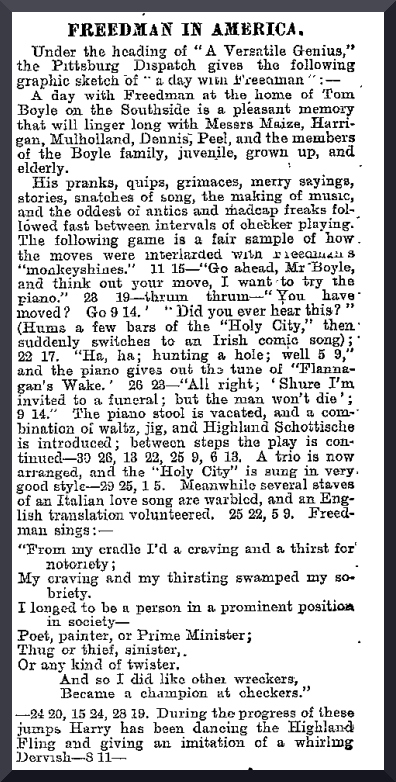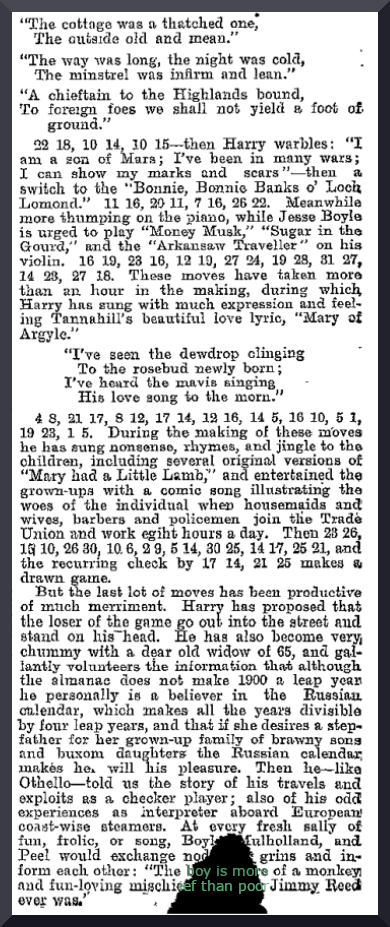Harry Freedman – Biography
Harry Freedman (1878-1966) by Grandmaster Hugh Devlin.
Harry Freedman (born Harris Fredwin) was born in Dundee on 5th Dec 1878. He was of Jewish origin and the son of a Rabbi. His family removed to Glasgow around 1890. In 1893 he joined the Hutchesontown draughts club and at once was recognized as having a natural aptitude for the game.
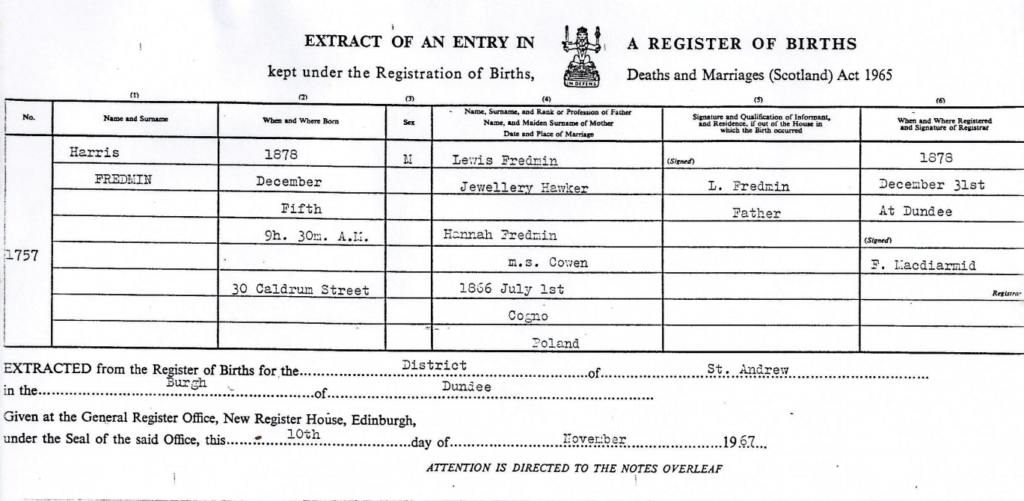
Freedman’s success in the game was quite extraordinary. He competed for the local club championship in 1895, ’96, and ’97 winning it on each occasion. He competed in the Scottish Championships of 1896 but lost his match to the vastly experienced J.C. Brown (The famous “border champion”). His play was described as brash, self-reliant, and “fearlessly venturing upon new ground”.
The following year Harry Freedman travelled to the USA to seek employment. An account of this journey (in his own words) was recorded in a book entitled “Silent Challenge” (1950) by Ivor Powell in a chapter entitled “The Rabbi’s Son”. He found employment as a bookkeeper but ended up giving simultaneous exhibitions and engaging in a series of challenge matches against a Mr. Swain, Dr. Schaefer, Sam Grove and C. F. Barker. Returning home via London, Freedman played a four-game drawn match with the celebrated Alf Jordan.
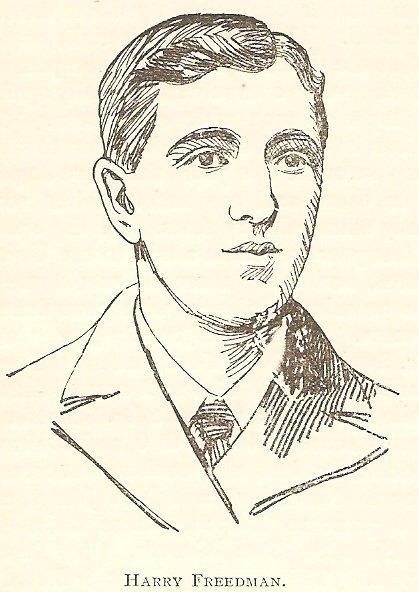
In the Scottish Championship of 1898, Freedman truly came of age by winning this tournament. Its entrants included legendary competitors’ such as James Wyllie, James Ferrie, George Buchanan, A. B. Scott, W. Campbell, Hugh Henderson, R. G. Mc Millan, and G. M. Bonar. In doing so he became the youngest Scottish champion of all time at just 19 years old, a record that still stands!
He further demonstrated that it was no error, when he again won the same Scottish Draughts Championship of 1899, that included all the previously named, in addition to Robert Stewart, Wm. Bryden, and Freedman’s former coach James Searight.
It would seem that although Freedman was one of the game’s most brilliant and gifted players, he also retained his youthful ways as the following article from the “Glasgow Herald” (1898) related…
“During his recent stay at Lockerbie, (southern Scotland) he took the opportunity of driving to Moffat, being accompanied by Mr. James G. Carruthers, another enthusiastic lover of the silent game. On their return journey a discussion took place as to whether a pedestrian could race a horse attached to a vehicle, Freedman contending that a match between the two would result in favour of the runner, while Carruthers thought the horse would win. To settle the matter the former volunteered to race the horse half-a-mile along the road, and, on Carruthers acquiescing, the young Scottish champion got out of the gig and divested himself of his coat and vest, and a good start was effected. At the outset Harry forged to the front, but the horse to which the whip had frequently been used, drew level when half the distance had been traversed. The runner, after plodding on for a couple of hundred yards further, got into a “critical position”, and was forced to resign. A gentleman, resident in the district, who witnessed the event, informed the police that “a patient had escaped from the Dumfries Lunatic Asylum, and a man driving in a gig was after him”.
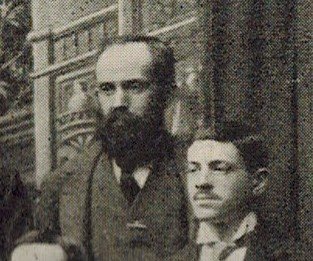
Freedman then went on a tour of Scotland and England playing exhibition matches and giving simultaneous displays, which included playing while blindfolded and playing mixed games of draughts and chess. In the Scottish Championship of 1900, Freedman lost a protracted match with Robert Stewart (who went on to win the Championship) 3-2 and 9 games drawn, with two of these games lasting more than five hours each. Shortly afterwards Freedman returned to the USA where he spent most of the next year.
In 1901 Freedman challenged the World Champion Richard Jordan of Edinburgh to a match for the World Title and this was played at Edinburgh, Scotland, commencing 12th July 1902. Richard Jordan was leading by 7-1 & 21 draws when Freedman sensationally resigned leaving eleven of the stipulated forty games un-played. The games can be found in Draughts Praxis or Modern Match Games by Frank Dunne. It is now clear that this was a troubled time for Harry as later detailed in a book by Ivor Powell called “Silent Challenge”.
Later that same year Harry Freedman emigrated to South Africa where he gained employment in Johannesburg and he also changed the spelling of his surname to Freeman. In 1903 he travelled to Port Elizabeth where he converted from Judaism to Christianity. While there he joined the Salvation Army and spent the next 30 years working as a missionary to spread the Gospel.
A newspaper article published in the “The Standard”, Krugersdorp, South Africa, during 1906 related;
“In the Salvation Army Hall, Dingaan St. one of the wonderful trophies of grace and the Army’s work will give the story of his life. This particular individual is Captain Harry Freedman, the late renowned draughts and chess player, who as a professional player has given exhibitions in all the leading countries in Europe, as well as in the United States – but since his conversion he has given up playing and had devoted all the time possible to Salvation Army work. By birth an orthodox Jew, Freeman is a Christian by conviction, but many Hebrews- for whom he has the warmest affection – have in various parts made a point of hearing him. He is not only an impressive speaker, but a fine singer, and through him many have already been drawn to Christ. The meeting will again be led by Captain Freedman”.
A correspondent to the “Draughts World” magazine in 1906 amends this account stating that: ““Harry” still loves a game, and at Krugersdorp he met Mr. G. Hosking of the Johannesburg YMCA Draughts club recently, and they played two friendly games, resulting in one win to Freedman and one draw. Freedman complimented Hosking as “the strongest player he has met yet in South Africa.”
Harry Freeman married Elizabeth Barnes in the Salvation Army Hall at Worcester, on 4th Feb 1908.
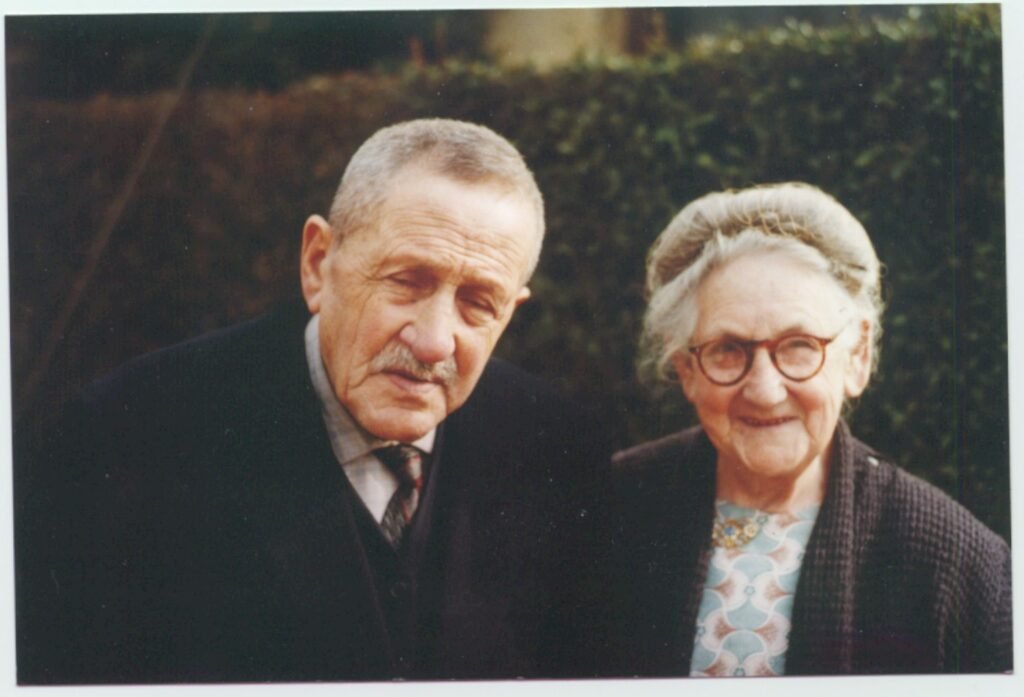
By 1910 Harry Freedman was still keeping in close touch with the game. At East London he give a simultaneous play where he contested 12 games of draughts and 12 games of chess, and succeeded in winning them all. Harry was residing in Johannesburg in 1911 and began editing a draughts column in the “Transvaal Weekly” newspaper, through which he arranged a match between the localities.
Mr. J. Mc Callum captained a team of nine players residing in Johannesburg, while Mr. Freedman captained a team drawn from Pretoria, Vereeniging, and Roodeport. Freedman defeated Mc Callum 3-0 & 1 draw in their individual match (See game below) while the overall result was a victory to Mc Callum’s team by 12 wins to 9 wins, and 8 games drawn. After the match it was decided to arrange a meeting to form a “Transvaal Draughts Association”. (Published in the “Draughts World” 1911, G. 2547)
White Win by 2nd Position.
If you are looking for more of Harry Freedman games. There is a book “The Checkers Games of Harry Freedman” by Jim Loy.
A Transvaal Championship was held in 1913 (the 1st was held in 1912) at the premises of the Nelscrust Dairy, Johannesburg, and it was opened by the Mayor. The final results of the 1913 championships; 1st H. Freedman 24 points, 2nd J. Haliburton 18pts, 3rd W. Mc Callum 18pts, and J. Dobie 16pts, J. Mc Cormack 12pts, J. Campbell 9pts, and brothers’ H. Broer 8pts, and B. Broer 7pts. It was further reported that Freedman was also gaining laurels in the field of chess around Johannesburg, having won the Union Chess Club handicap tournament of 1913 while playing from scratch, during which he lost one game out of 24 played.
World Champion Richard Jordan (Scotland) died tragically on 8th October 1911 having been struck by a tram car while crossing a street in Edinburgh. He had retired undefeated in 1903 after his match with Freedman. Former English Champion Alf Jordan, who had now taken up residence in the USA, made an open challenge to the world for a match to fill the vacant title of “World Champion” a month after Jordan’s demise. Robert Stewart (Scotland) who had previously played Richard Jordan for the World Title in 1897 also issued a challenge. On receipt of this news, Harry Freedman published the following in the draughts column he edited in the “Transvaal Weekly” …
“I hearby challenge any player in the world for £100 a-side and the championship. This offer will remain open until the end of June 1913. Failing an acceptance of the challenge, on or before that date, I shall claim the title. I am willing to allow my opponent £50 expences in the event of the latter being defeated.” Harry Freeman.
With news of a possible Alf Jordan Vs Robt. Stewart match being arranged, Harry Freedman sent a telegram to the “Draught World” stating that he would hold back on his challenge and was prepared to play the winner of the Jordan Vs Stewart match. John Campbell, the Hon. Secretary of the Transvaal Association, wrote to say that “Mr. Freeman’s supporters in South Africa have formed themselves into a committee to make arrangements for bringing this matter to an issue. There is plenty of enthusiasm for the game in this part of the world at the present moment, and a tournament open to all South Africa, which an energetic committee is carrying through, will bring the leading players together, and possibly see a South African Association”.
Harry Freeman resigned his position with the Salvation Army in the 1930’s and he moved to Roodepoort with his family where he was engaged in a business as a wholesale tennis-net manufacturer.
He remarked in 1932 that there are very few players in South Africa, and he spend his time playing correspondence games, many of which were against a fellow Scotsman called John M. Napier who at that time was domiciled in Blantyre, Nyasaland, East Africa. Harry Freeman died on the 17th November 1966 in Roodepoort, Transvaal. South Africa.
Harry Freedman in the news:
We do have plenty of more news material and other material on Harry Freedman. If you wish to have a look at it or want to discuss his life or other checkers/draughts topics please feel free to contact.
